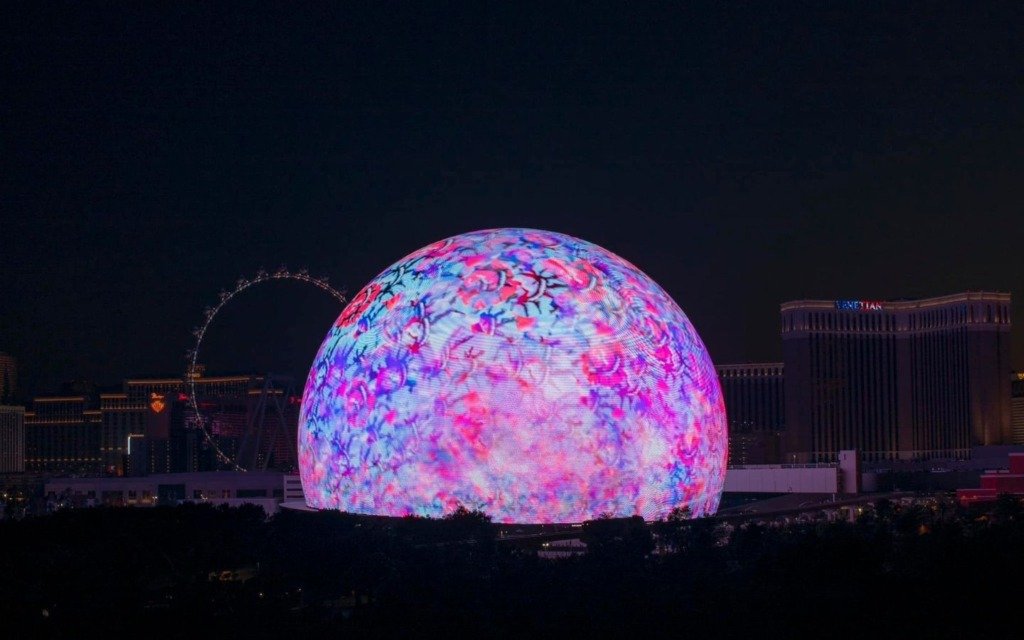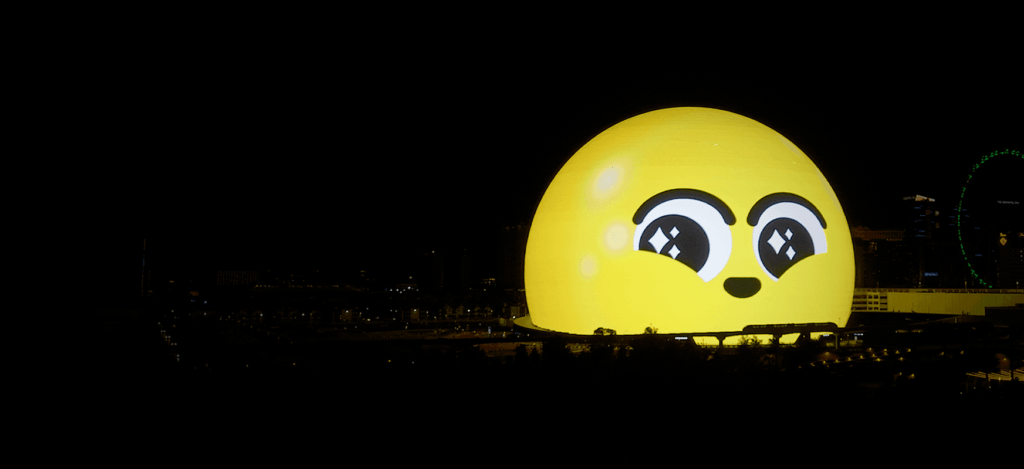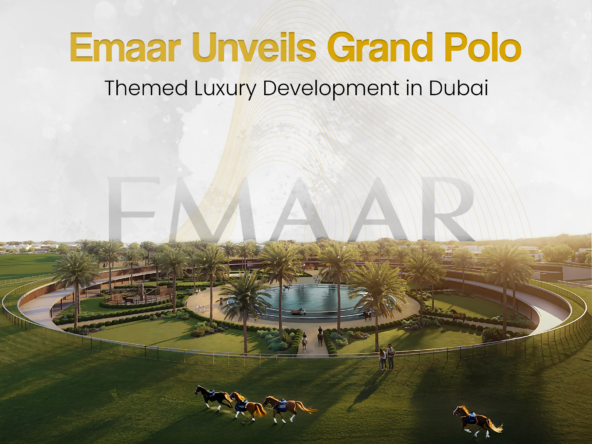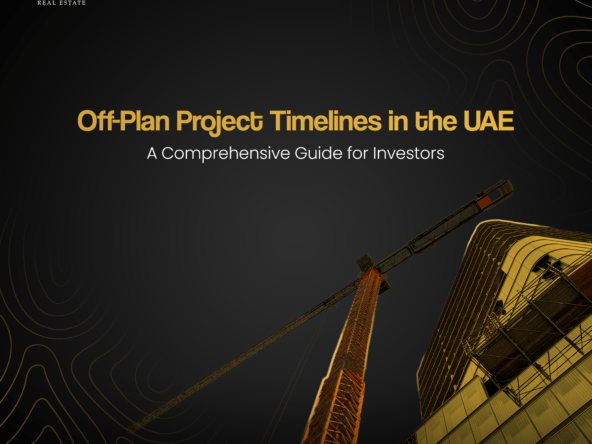Abu Dhabi is preparing to welcome a venue that can reshape its visitor economy, brand visibility, and live-events pipeline: the world’s second Sphere. Announced as a partnership between Sphere Entertainment Co. and the Department of Culture and Tourism – Abu Dhabi (DCT Abu Dhabi), the project is more than an architectural spectacle—it’s a new, programmable media platform with diversified revenue streams and a proven ability to draw premium audiences. For investors looking at the UAE capital’s next decade of growth, Sphere Abu Dhabi is a development to watch closely.
What’s Confirmed—and Why It Matters
In October 2024, Sphere Entertainment and DCT Abu Dhabi announced plans to bring a Sphere venue to the UAE capital, explicitly aligning the project with Abu Dhabi’s Tourism Strategy 2030. The official announcement also states that the Abu Dhabi venue will “echo the scale” of the Las Vegas Sphere, a 20,000-capacity arena famed for its immersive, next-generation audiovisual system and LED exosphere. While the precise site and opening date remain unannounced, the partner institutions describe a “prime spot” and a year-round programming ambition—signals that should encourage long-term investment planning across hospitality, retail, events, and surrounding real estate.

The Las Vegas Sphere, which opened in 2023, cost approximately $2.3 billion to build and reaches 366 feet (112m) in height with capacity for up to 20,000 attendees (17,600 seated). Its operating model pairs artist residencies and original “Sphere Experiences” with corporate events, brand activations, and high-margin advertising on its exterior exosphere. Abu Dhabi’s version is expected to mirror the scale and leverage the same proprietary content and technology stack—an important indicator for performance assumptions.
The Business Model: Franchise, IP, and Recurring Fees
For investors, the most meaningful detail is buried not in headlines but in filings. In July 2025, Sphere Entertainment filed an SEC Form 8-K confirming that the parties finalized a Franchise Agreement, Joint Development and Partnership Agreement, and Pre-Opening Services Agreement for Sphere Abu Dhabi.
Key points:
- Exclusive rights: DCT Abu Dhabi receives exclusive rights to build and operate Sphere Abu Dhabi, plus exclusive rights for additional Sphere venues across MENA for at least 10 years after Abu Dhabi’s opening, on terms to be negotiated in good faith.
- Payments: DCT pays a franchise initiation fee (in installments tied to milestones) and ongoing royalties after opening. Royalties include (a) an intellectual-property royalty tied to total revenues (excluding ticket sales for licensed Sphere Experience content), (b) a Sphere Experience content royalty tied to ticket sales for that content, and (c) an ancillary content fee that escalates annually.
- Term: The franchise has an initial term of 25 years, with options for two 10-year renewals.
- Services: Sphere Entertainment provides pre-construction and construction-related services before opening and expects an Operational Services Agreement for post-opening venue and technology operations.
These mechanics translate Sphere into a long-duration, IP-rich asset with embedded recurring fees—a compelling structure for modeling cash flows, vendor ecosystems, and secondary investment theses around content, hospitality, and mobility.
Programming & Technology: Why Audiences Pay a Premium
Sphere’s differentiation is not just shape—it’s sensory. The Las Vegas venue pairs a 16K wraparound interior LED plane with advanced beam-forming audio (HOLOPLOT), environmental effects, and cinematic production standards. This combination has already supported blockbuster residencies and high-profile corporate showcases. For Abu Dhabi, replicating the technology stack suggests similar pricing power for tickets, suites, sponsorships, and business-events bookings—especially in a city already optimized for international arrivals and premium hospitality.
Advertising & Brand Activations: The Exosphere Advantage
Beyond tickets and residencies, the exosphere—Sphere’s programmable exterior—functions as city-scale out-of-home media. In Las Vegas, reported rates for short-run exosphere placements have reached hundreds of thousands of dollars per day, drawing blue-chip advertisers for product launches and tent-pole events. Translating that to Abu Dhabi’s year-round calendar (F1, concerts, cultural festivals, conferences) creates a fresh monetization channel for brands targeting GCC and global audiences.
Timeline & Location: What We Know (and Don’t)
Abu Dhabi officials and Sphere Entertainment have not publicly released a site or opening date. However, subsequent coverage indicates the project is advancing through pre-construction, with investor commentary reinforcing the brand’s global build-out strategy. The absence of a confirmed location introduces near-term uncertainty but also presents upside scenarios for districts that land the sphere—spanning land valuations, hotel pipeline planning, mobility upgrades, and new retail F&B clusters.
Separately, regional reporting notes no construction start date has been announced and reiterates the “prime spot” positioning. For investors, this underscores a practical approach: treat timelines conservatively while preparing to move quickly when final siting triggers surrounding land and lease repricing.
Ripple Effects: Real Estate, Hospitality, and the Visitor Economy
- Hotels & Serviced Apartments. A Sphere-anchored events calendar can increase average daily rate (ADR) and occupancy within a 10–20 minute radius, particularly for luxury and upper-upscale assets. Expect premium pricing during residency cycles and major corporate showcases. Properties with high-quality audiovisual spaces and flexible event floors will be best positioned to capture pre- and post-show demand.
- Mixed-Use & Retail. Footfall-driven concepts benefit from the predictable cadence of Sphere programming. Think curated dining, experiential retail, and after-show lounges that connect seamlessly with venue ingress/egress. Tenancy mixes can skew toward concept-led F&B, luxury lifestyle brands, and immersive installations.
- Branded Residences & Short-Stay. Within proximity, branded residential projects stand to gain from global halo effects—similar to how major cultural anchors uplift address desirability. Short-stay operators can design Sphere-themed packages, VIP transfers, and concierge experiences that command premium rates.
- Mobility & District Infrastructure. Expect upgrades in parking, wayfinding, last-mile transit, and possibly waterfront or rail connectivity depending on the final site. These public-realm enhancements generally compress travel times and raise surrounding livability scores—useful inputs for underwriting.
- MICE & Corporate Events. The Las Vegas venue has already hosted high-visibility corporate activations and is slated for headline keynotes at tech mega-events. Abu Dhabi’s established conference infrastructure (ADNEC, large hotels, airlines connectivity) can compound this effect, converting the Sphere into a must-book stage for product launches, global summits, and incentive travel.
Risk & Sensitivity Considerations
- Siting risk: Land-value appreciation depends on the chosen district. Maintain diversified exposure or structure options that allow repositioning as site clarity emerges. (No official site confirmed.)
- Timeline risk: Pre-construction progress is encouraging but not a substitute for final permits and EPC mobilization. (Pre-construction nearing completion per recent reporting.)
- Content cadence: Sphere’s economics are sensitive to blockbuster residencies and high-margin “Sphere Experiences.” Investor models should assume variable content performance and seasonality.
- IP & fees: Franchise, IP, and royalty structures are long-dated and layered. This is positive for platform stability but requires careful forecasting of minimum payments, escalators, and revenue-share mechanics.

Exclusive Investor Highlights (Actionable Takeaways)
- Long-duration moat: The 25-year initial term plus two 10-year renewals embeds a multidecade operating horizon—attractive for investors seeking visibility across cycles.
- MENA exclusivity window: A 10-year exclusive right to develop additional Spheres across MENA (post-Abu Dhabi opening) positions the capital as the regional hub—helpful for allied investments in content creation, production services, and touring logistics.
- Stacked monetization: Unlike traditional arenas, Sphere layers ticketing, content licensing, exosphere media, sponsorships, suites, and corporate events, creating diversified, premium revenue channels that can smooth seasonality.
- Brand amplification effect: The exosphere doubles as a city-scale billboard with global social reach—historically commanding six-figure daily rates in Las Vegas, and likely to be in high demand around Abu Dhabi’s hallmark events.
- District uplift potential: Hotels, mixed-use retail, F&B, and branded residences near the eventual site should prepare for ADR expansion, length-of-stay gains, and cap-rate compression as visibility and footfall compound. (Inference based on Sphere’s operating model and major-venue precedents.)
- Content ecosystem opportunity: Abu Dhabi’s creative sector can build studios, VFX capacity, and immersive production services tailored to Sphere’s 16K canvas—unlocking local-to-global export potential.
- Downside controls: With franchise/IP fees tied to revenue shares and minimums, structuring adjacent investments with flexible returns (e.g., participation with floors/caps) can mitigate content-cycle volatility.
What to Watch Next
- Site announcement & master-planning. The chosen district will drive land-use patterns, last-mile transit, and ancillary development opportunities. Prepare site-specific theses for multiple plausible locations, each with its own retail and hospitality playbook. (No official location yet.)
- Permitting & construction milestones. Track contractor appointment, enabling works, and EPC sequencing. The minute ground breaks, pricing begins to move for nearby assets—especially for hotel keys and high-visibility retail corners. (Pre-construction reported near completion.)
- Programming calendar. Look for first-wave residencies and original Sphere Experiences announcements; these define seasonality and peak-rate windows for hotels, F&B, and premium transport services.
- Regional strategy. The MENA exclusivity framework hints at a multi-city network over time. If Abu Dhabi becomes the regional hub, upstream suppliers (content, AV, show control, creative tech) will see platformable demand for at least a decade.
Bottom Line
Sphere Abu Dhabi is not just another venue; it’s a programmable media and experiences platform with contracted IP economics and a proven ability to command global attention. For investors, the opportunity is twofold:
- Direct exposure to the Sphere’s multi-revenue stack (where accessible); and
- Adjacency plays in hotels, branded residences, district retail, mobility, and creative production services that benefit from Sphere’s halo effect.
With the franchise model, MENA exclusivity window, and long-dated operating term now formalized, the stage is set for Abu Dhabi to convert cultural ambition into durable, premium demand.
The prudent approach today: build flexibility into your models, prepare site-contingent plans, and be ready to deploy when the location is revealed and construction milestones begin to cascade.




